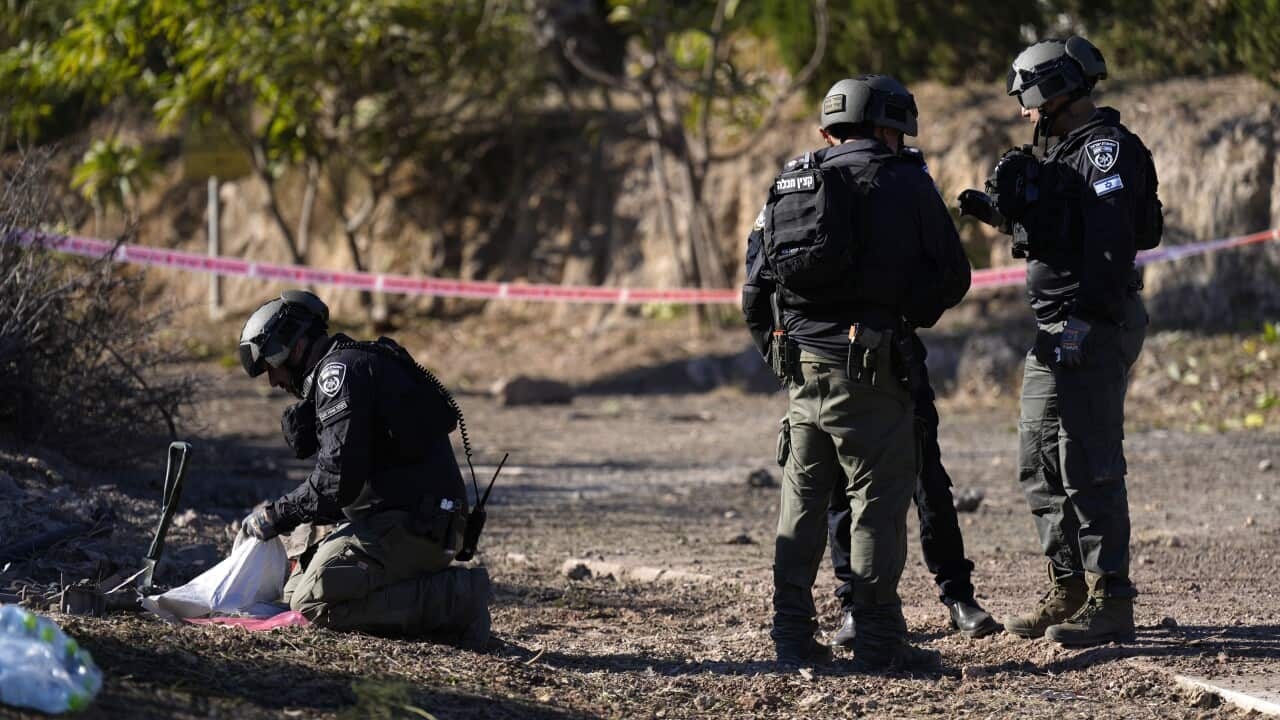Key Points
- Hezbollah says it has launched rockets at two key Israeli bases and Israel targeted southern Lebanon overnight.
- US Secretary of State Antony Blinken has travelled to Israel to push for a ceasefire.
- Analysts say a ceasefire is “hard to imagine” amid intensified fighting in recent weeks.
Hezbollah early on Tuesday morning said it launched volleys of rockets at two key bases near Tel Aviv and a naval base west of Haifa.
The latest attacks came ahead of US Secretary of State Antony Blinken’s arrival in Israel to launch another push for an elusive ceasefire.
Diplomatic efforts have thus far failed to bring an end to the year-long Gaza war and its spillover conflict between the Lebanese armed group Hezbollah and Israel.
The conflict has intensified in recent weeks after a year of exchanging fire mostly across Lebanon’s southern border.
Rockets fired into Israel, Hezbollah says
After a heavy night of Israeli strikes on Lebanon’s south and the southern suburbs of its capital, Hezbollah said it had fired rockets at the Glilot base used by Unit 8200 of Israel’s military intelligence, and the Nirit area in Tel Aviv’s suburbs.
The group said it also fired rockets at a naval base outside of the port city of Haifa further north.
Lebanese state media reported Israeli strikes on Hezbollah’s south Beirut bastion overnight. Source: ABACA / Fayad Marc/ABACA/PA
There were no immediate reports of casualties. Israeli authorities said air sirens were activated in areas southeast of Tel Aviv due to one projectile identified crossing from Lebanon and falling in an open area. Other sirens sounded in Tel Aviv.
Israel’s multi-layered air defences have intercepted the vast majority of missiles and drones fired at it since the start of the Gaza war.
Blinken’s trip to the region is his 11th since the attack on Israel by the militant group Hamas onthat triggered the Gaza war.
It comes as Israel intensifies its military campaign against Iran-backed militants Hamas in the Gaza Strip and Hezbollah in Lebanon.
Blinken is seeking to revive negotiations to end the Gaza war and defuse the conflict in Lebanon, in a week-long Middle East visit which also includes Jordan and Doha.
In Israel, he will discuss Israel’s retaliation for Iran’s 1 October ballistic missile attack, said a senior State Department official, speaking on condition of anonymity.
A retaliation could disrupt oil markets and risks igniting a full-blown war between the arch-enemies.
Last week Blinken and U.S. Defense Secretary Lloyd Austin wrote to Israeli officials demanding concrete measures to address the worsening situation in Gaza, or face potential restrictions on US military aid.
The US official said that in meetings with Israel and Arab countries, Blinken will drill down on “day after” issues, particularly security, governance and reconstruction. Detailed plans for each of these have been seen as prerequisites for achieving any lasting resolution to the conflict.
Breakthrough ‘hard to imagine’
Experts say Hamas and Israel remain deeply at odds and are unlikely to make significant concessions before the Nov. 5 U.S. presidential election, which could upend US policy.
“It’s very hard to imagine” that Blinken would score a breakthrough this week, said Aaron David Miller, a senior fellow at the Carnegie Endowment for International Peace, given that neither Hamas nor Netanyahu have any urgency to end the war.
“Taking advantage of the moment is a fundamentally misleading sort of concept in this case because I’m not sure there is a moment,” Miller said.
In the last month, Israel has assassinated the leaders of Hezbollah in Lebanon and ofwhile showing no sign of reining in its ground and aerial offensives.
The Biden administration has cast the killing of Hamas leader Yahya Sinwar by the Israeli military last week as a possible opening that would finally pave the way to end the Gaza war, but Israeli Prime Minister Benjamin Netanyahu says fighting will continue.
Sinwar was one of the alleged masterminds of the 7 October attack on Israeli communities that killed around 1200 people, with about 253 more taken back to Gaza as hostages, according to Israeli tallies.
Israel’s subsequent bombardment of Gaza has killed more than 42,500 Palestinians, with another 10,000 uncounted dead thought to lie under the rubble, Gaza health authorities say.
UN resolution ‘not enough’, US says
US envoy Amos Hochstein held talks with Lebanese officials in Beirut on Monday on conditions for a ceasefire between Israel and Hezbollah.
Hochstein said it was “not enough” for both sides to commit to U.N. resolution 1701, which ended the last round of conflict between Israel and Hezbollah in 2006 and which calls for southern Lebanon to be free of any troops or weapons other than those of the Lebanese state.
He said neither Hezbollah nor Israel had adequately implemented the U.N. resolution, and that while it would be the basis for the end to current hostilities, the U.S. was seeking to determine what more needed to be done to make sure it was implemented “fairly, accurately and transparently.”
Lebanon’s health ministry said on Monday that the death toll since Israel’s offensive began had risen to 2,483, with 11,628 injured. Israeli authorities say 59 people have been killed in northern Israel and the occupied Golan Heights over the same period.

